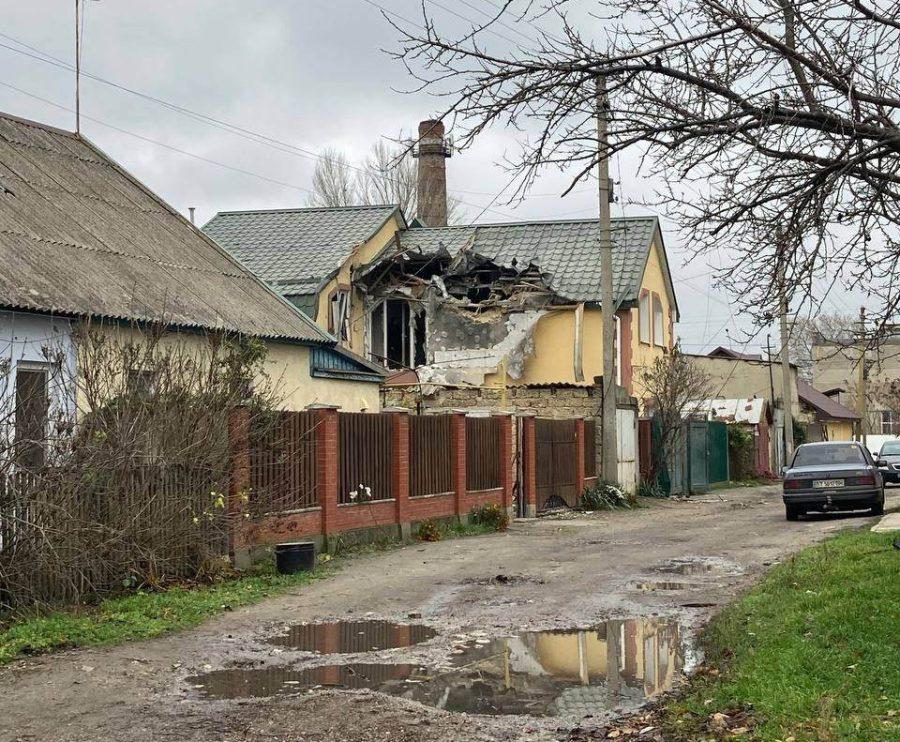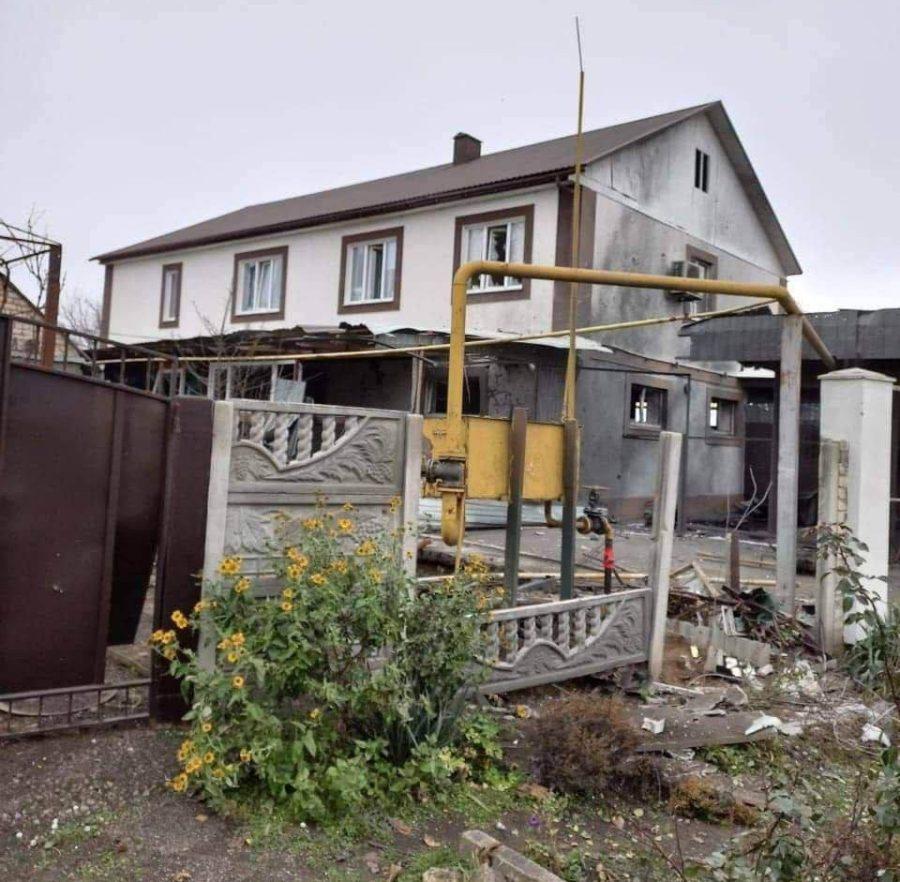Chilling testimony of a Romani activist about Russia's occupation of Ukraine and destruction of the Romano Than center in Kherson Oblast

Yanush Panchenko is a researcher of Roma culture and language, public activist, ethnographer and historian. He is a Roma by origin. Yanush was born in Kakhovka, Kherson region. He is one of those who survived the Russian occupation in his hometown. I saw how the Russian military occupied the city, broke down the doors of the residents’ houses, and took other people’s property. They broke and destroyed everything. The premises of the “Romano Than” Roma center, which Yanush and his associates founded a year ago, were taken away from them, but the Roma activist managed to get out of the occupied zone. Now he tells his testimony of the occupation by the Russian military and, despite everything, dreams of one day returning to Nova Kakhovka.
February. The war really started
The morning of the 24th of February began unexpectedly and not as usual for Yanush,, as for all Ukrainians. He woke up to the explosions at dawn. The walls of the house shook violently, and the hum of the rockets did not subside. After looking at the news, he did not find anything. Then he simply wrote “explosions in Kakhovka” into Google, but he did not receive any information there either. Not understanding what was happening, he opened the school chat window, which was crammed with messages from his students that the war had started. Then he realized that the situation was becoming more and more serious. The first thing he decided to do was to pick up his brother, who at that time lived in Nova Kakhovka. It was there that the most explosions were heard, and the air was exhausted from the enemy rockets. His brother said that a neighbor had come to them and informed them of the beginning of the war. She told him, “Let’s hide in the bomb shelter.”
Enemy tanks entered the town
The road was full of military equipment. APCs and military vehicles constantly passed by. The morning breathed anxiety. Yanush had to make it several long kilometers to see his brother and transport him to a safer place. At first, it seemed to Yanush that the Ukrainian military had come to the city for protection and patrolling. He did not believe that enemy tanks would be able to enter the city so quickly and move through the streets. When he and his brother were already returning to Kakhovka, they saw a dozen completely burned and crushed cars on the way. Then everything became clear: The enemy had come to the city. “The invaders probably thought that Nova Kakhovka and Kakhovka are one city. That’s why they shot mainly on the outskirts of Nova Kakhovka,” says Yanush. The Russian military was based in Nova Kakhovka, so it was calmer and safer on the other side – in Kakhovka.
Life under a quiet occupation
For the first few months, Yanush Panchenko’s family gathered together with other Roma families. During the day they mostly stayed at home, and in the evening they listened to the roar of military planes flying over the roofs. Over time, people began to get used to it and to slowly go outside. Yanush decided not to sit idly by, but to try to do something useful. First, he called the city council, where he knew some of the workers well, and offered his help as a volunteer. They immediately decided he would be able to supply the poorest Roma families with food and bring them everything they needed. This is how the Roma activist worked for some time together with the employees of the Kakhovka City Council. Later he established contact with foreign volunteers – they sent funds to an open charity account, and Yanush bought products and helped others. The biggest shortage was of milk. At the time it was simply impossible to get it. Therefore, he put only what was available in the humanitarian aid packages.

The Ukrainian flag flies again on the city hall
The residents were getting more and more used to the shots that sounded most often in the evening and at night. During the day, they continued to do their daily business. For two days, one of the invaders hung the Russian tricolor on the building of the city council, but in a few days it was replaced by the blue and yellow Ukrainian one. After that, life went on. Somehow Yanush realized that his mobile connection was disappearing more and more often. First for a few days, then for a long period. It became impossible to communicate with foreign volunteers. Later the aid activities simply stopped for that reason.
May. (Not) to cook dinner for the invaders
On the 9th of May, Yanush woke up at nine in the morning with a thought about the Roma center “Romano Than” in Kakhovka. Then he was informed that the doors of the center had been broken down by the Russian military and that after a while they had invaded the premises altogether, not letting anyone in. For the Roma activist, this was the first warning that he had to make the decision to leave the city. Every day activists and journalists were abducted from Kakhovka. When it got to the point that Yanush’s friends started disappearing, he realized that this could happen to him as well. Russian equipment moved freely through the city more and more often, and the number of invaders increased every day. The residents suffered from a humanitarian crisis – there was almost no medicine, food or other necessary means of subsistence. The neighboring villages in Kherson Oblast – Oleksandrivka, Bilozerka, and Vysokopillia – became a target for the enemies, and for the inhabitants became places where it was increasingly difficult to breathe. At any time, the Russian military went into people’s homes, ordering them to cook dinner. Equipment and other valuables were taken from them. Those who tried to protest or object were beaten and abused. Residents came out of their houses in the middle of the night to leave their homes. They looked for shelter where it could be safer. More and more people left Kakhovka every day. The city was orphaned before our eyes.

“You sit at home, and he comes silently with a gun, takes a bath, takes everything he needs. If you pretend that everything is fine, then he goes away. And when you start to protest, he beats you,” recalls Yanush. Almost none of his relatives or friends remained in the city, they had all left. They left everything behind at will. The only thing holding him back was his own home. The neighboring houses became empty in front of his eyes. There was almost no light in the windows. Kakhovka was rapidly turning into a ghost town. “When you sit in the basement, you don’t understand why you are sitting here, why? We believed that we would be able to return to normal life. But we quickly realized that it would not be like that”.
A drunk soldier with a weapon in his hands is an invader
At the checkpoints, people were not allowed to leave for several days – or even worse, for weeks. Often tired and bereft of all hope, they returned to the occupied villages, towns, and homes. The road was constantly being shelled by the Russian enemy. Some were wounded by shrapnel, some died right in front of their relatives. Yanush was waiting for the day when the situation would become calmer, but such a day never came. He decided to leave through Crimea, although my understanding was that this route could be even more dangerous. Seventy long kilometers – the road from Kakhovka to the first checkpoint in the direction of occupied Crimea. Near Chonhar, the first Russian soldiers stopped the car. Drunk and with a machine gun in their hands, they started talking to Janusz in a quite unfriendly way. They made unclear claims.
“Drunk soldier with a weapon in hand. Invader! He stopped me and started yelling at me. The feeling was so-so,” recalls Janusz. Airplanes were buzzing everywhere, machinery was moving. Crushed materiel was returning to Crimea, new equipment was heading further into Ukraine.
Filtration camp on the border
Next came another checkpoint. Here Yanush was interrogated for several hours. A special “interview” was scheduled. They took away his smartphone and checked all his correspondence. For several long hours he waited for his verdict, scrolled through various options in his head. All the time he was thinking about the Instagram network where there were many publications about the resistance of the Roma against the Russian occupiers. After long hours of questioning, he got permission to cross and went to the border with Latvia. There were still 37 hours of waiting ahead of him. The Russian border guards deliberately did not allow all the Ukrainian cars to pass. His documents were taken away. They were forced to return to the end of the queue. After passing through this cycle, at two o’clock in the morning the next day, Yanush and his family managed to cross the Russian-Latvian border.
Latvia supports Ukraine!
Already on the Latvian side, the Latvian border guard checked their documents and crossing permits in just 20 minutes. “I couldn’t believe that it finally happened. I asked the border guard, ‘What’s next?’ And he said, ‘It’s okay, go. Have a safe trip!’ ” Yanush’s car was soon speeding along the road. Everyone in the car felt calm and relieved. There was a big sign on the road: Welcome to Latvia. Latvia supports Ukraine in the war with the Russian aggressor. We will do everything to make Ukrainians feel safe. “This inscription was more pleasant for me than ever.”
Today Yanush lives in Berlin in a camp for Ukrainian and Roma immigrants. He has re-established contact with international volunteers. He tries in every possible way to assist the Ukrainian Roma who were forced to leave their homes in Ukraine as a result of the Russian aggression and continues to do research work. Now he is investigating how the war will affect the new generation of Roma in Ukraine. He dreams of restoring the Roma center in Kakhovka and opening the door of his own home again.
Original article: Life of a Roma activist under occupation
This article has been republished in Czech and English on news server Romea.cz in cooperation with the Romani Ukrainian NGO ARCA – Youth Agency for the Advocacy of Roma Culture.